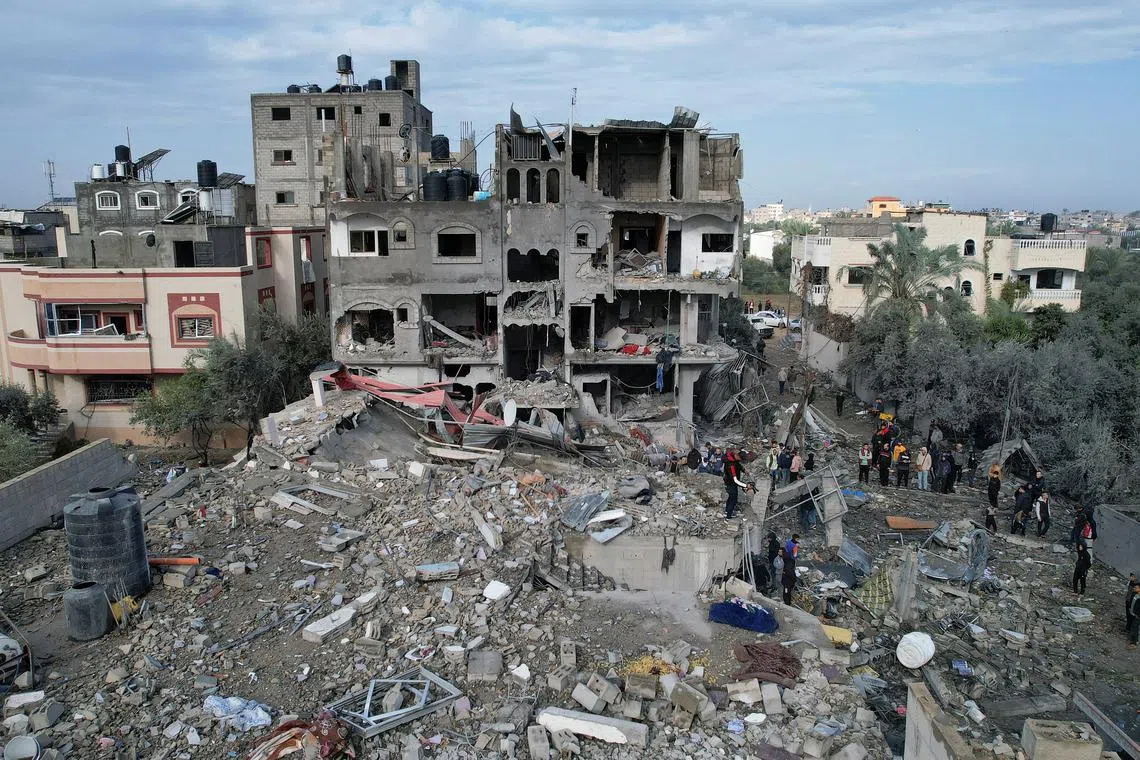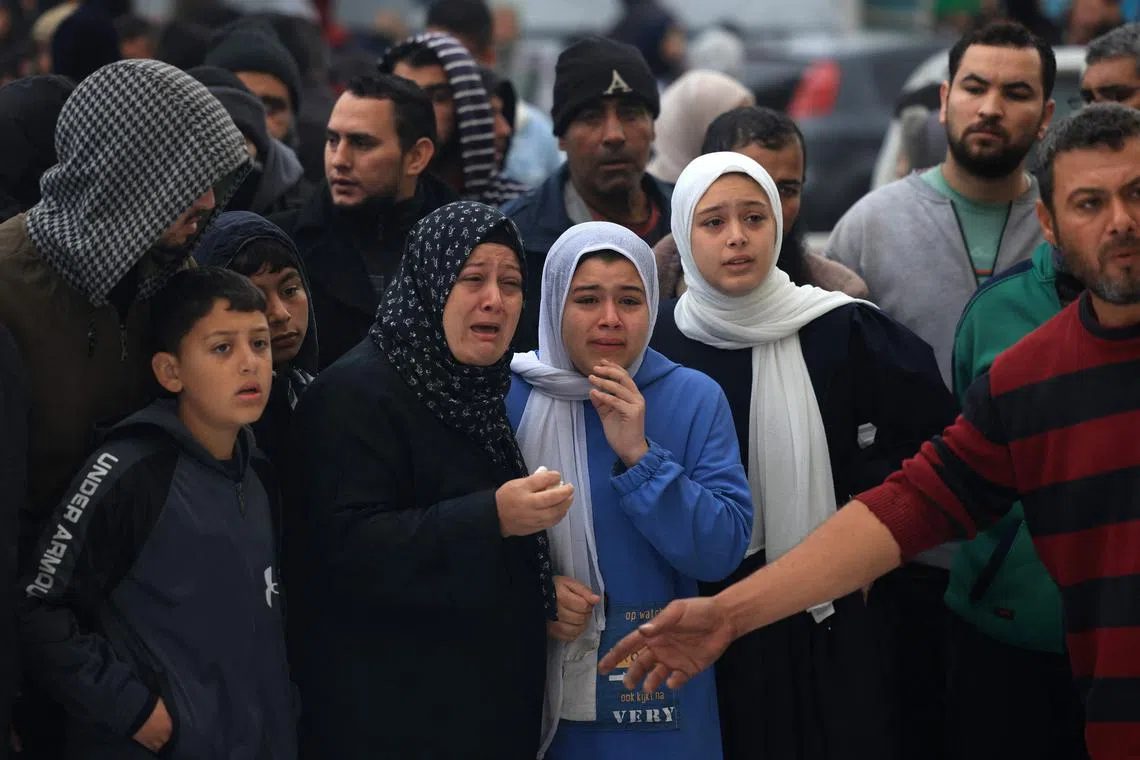Israel bombs Gaza after Netanyahu rules out peace until Hamas is destroyed
Sign up now: Get ST's newsletters delivered to your inbox

The site of Israeli strikes on houses at al-Maghazi refugee camp in the central Gaza Strip on Dec 25.
PHOTO: REUTERS
Follow topic:
JERUSALEM - Israel bombed Gaza on Dec 26 after Prime Minister Benjamin Netanyahu said the war in the devastated, tiny enclave was far from over.
The Israeli army said it struck more than 100 targets in 24 hours, including military sites and tunnel shafts in central Jabalia and Khan Younis in southern Gaza, as heavy ground combat continued.
Mr Netanyahu dismissed what he cast as false media speculation that his government might call a halt to fighting against the militant group Hamas in Gaza.
“We are not stopping. We are continuing to fight, and we will be intensifying the fighting in the coming days, and the fighting will take long, and it is not close to concluding,” he told lawmakers from his Likud party.
Mr Netanyahu vowed to stay the course in an op-ed published in the Wall Street Journal late on Dec 25.
“Hamas must be destroyed, Gaza must be demilitarised, and Palestinian society must be deradicalised,” he argued. “These are the three prerequisites for peace between Israel and its Palestinian neighbours in Gaza.”
Once the fighting ends, he said, “for the foreseeable future, Israel will have to retain overriding security responsibility over Gaza” and build a “temporary security zone on the perimeter” of the territory.
Mr Netanyahu earlier visited Israeli troops inside Gaza, then reportedly told a meeting of Likud that “we are not stopping... We are intensifying the fighting in the coming days”.
The bloodiest-ever war in Gaza erupted when Hamas attacked southern Israel on Oct 7,
Israel launched extensive aerial bombardment and a siege, followed by a ground invasion.
The campaign has killed 20,674 people, mostly women and children, according to Gaza’s Health Ministry.
Earlier on Dec 25, two Egyptian security sources told Reuters that Hamas and the allied Islamic Jihad have rejected an Egyptian proposal that they relinquish power in Gaza in return for a permanent ceasefire.
Both groups have been holding separate talks with Egyptian mediators in Cairo.
They rejected offering any concessions beyond the possible release of more hostages seized on Oct 7
One of the deadliest nights
The Israeli army published footage showing its troops moving through the muddy war zone of shattered buildings as gunfire rings out, tanks churning up dust and a soldier firing a heavy machine gun from a window.
Overnight into Dec 25, Gaza endured one of its deadliest nights in the 11-week-old war.
Palestinian health officials said at least 70 people were killed by an Israeli air strike
Israeli planes and tanks carried out dozens of air strikes on houses and roads in Al Bureij and nearby Al Nusseirat and Al Maghazi.
Several residents made pleas on social media for people to afford them shelter as they had become homeless after leaving their homes in Bureij.
“I have 60 people in the house, people who arrived at my house believing that central Gaza area was safe. Now, we are searching for a place to get to,” said Odeh, a resident of the refugee camps.

Palestinians mourning their relatives who were killed in an overnight Israeli strike on al-Maghazi refugee camp, at a mass funeral at a hospital in the southern Gaza Strip on Dec 25.
PHOTO: AFP
World Health Organisation (WHO) staff visited a hospital treating victims of the strikes and “heard harrowing accounts” from health workers and victims.
Mr Sean Casey, a WHO emergency medical teams coordinator, described the fate of a nine-year-old being treated who was expected to die.
“He was crossing the street in front of the shelter where his family is staying and the building beside him blew up,” he said.
Vast areas of Gaza lie in ruins, and its 2.4 million people are enduring dire shortages of water, food, fuel and medicine, alleviated only by the limited arrival of aid trucks.
“Now, there is real hunger,” said Ms Nour Ismail, who was waiting for food to be distributed in the southern city of Rafah. “My children are dying of hunger.”
Pope grieves
Clergy cancelled Christmas celebrations in Bethlehem, the Israeli-occupied Palestinian West Bank city where Christian tradition says Jesus Christ was born in a stable 2,000 years ago.
Pope Francis on Dec 25 focused his Christmas address on the violence in Israel and the war in Gaza that had caused an “appalling” loss of civilian life and brought “sorrow” to Bethlehem, traditionally seen as the birthplace of Jesus, as he called for the release of Israeli hostages and an end to devastating military attacks.
He pleaded for peace around the world, naming specific conflicts, including in Armenia, Azerbaijan, Sudan and Ukraine, but it was the conflict in Gaza that was foremost in his message.
“The eyes and the hearts of Christians throughout the world turn to Bethlehem,” Pope Francis said, calling attention to “deep shadows covering the land”.
He pleaded for peace to “come in Israel and Palestine, where war is devastating the lives of those peoples”, and said he embraced “them all, particularly the Christian communities of Gaza, the parish of Gaza and the entire Holy Land”.
Israel has been under pressure from its closest ally, the United States, to shift operations to a lower-intensity phase and reduce civilian deaths.
On Dec 23, Israel’s military chief of staff said his forces had largely achieved operational control in the north of Gaza, and would expand operations farther in the south.
But residents say fighting has only intensified in the northern districts. REUTERS, AFP

